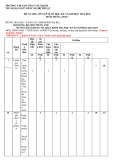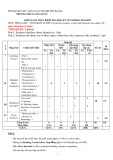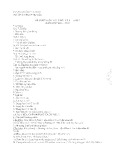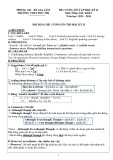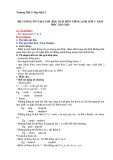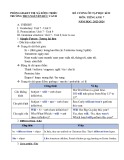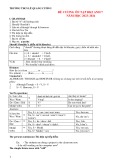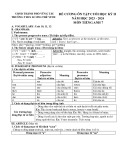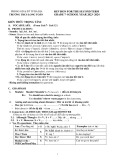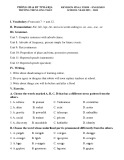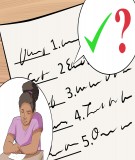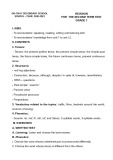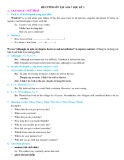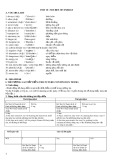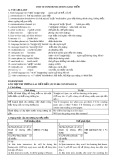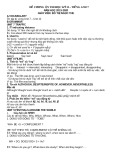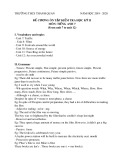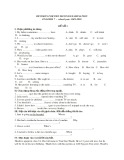ĐỀ CƯƠNG ÔN TẬP ANH 7 HỌC KỲ 2
A. GRAMMAR - NGỮ PHÁP 1. Used to: (Chỉ thói quen trong quá khứ)
“Used to” is to talk about past habits. It has the same form in all persons, singular and plural. It forms its
Ex: I used to cry when I was a baby.
I didn’t use to sleep late. Did you use to sleep late?
negative and interrogative form with did. 2. Distance
− How far is it from ....................... to .......................? − It is about + km (from ............ to ............)
Ex: Although my homework was difficult, I finished it before bed time. (Or) I finished my homework before bed time, although it was difficult.
We use “although, in spite of, despite, however and nevertheless” to express contrast. (Chúng ta sử dụng các liên từ nối diễn tả sự tương phản) 3. Although + S + V, S + V 4. in spite of/ despite + -ing form, subject + verb (or) in spite of/ despite + noun, subject + verb Ex: In spite of revising for hours, I didn't do well in the test.
Despite my revision, I didn’t do well in the test. (Or) I didn’t do well in the test, despite revising for hours.
Ex: We believed that we would find a solution. However, we went wrong.
5. S + V. However, S + V 6 S + V. Nevertheless, S + V Ex: Thomas has lived in the village for 10 years. Nevertheless, the villagers still considered him to be an outsider.
7. Question words: When/ Where/ What/ Why/ How/ Who/ Whose/ Which
Examples: − What time do you get up every day?
− When were you born?
− What did you do yesterday?
− How long have you learnt English?
− Why do you usually go to class late?
− How did you get to school yesterday?
− Which books does he read every day?
− Where do your parents live?
− Who did you go with last summer vacation?
8. Adverbial phrases
− manner (chỉ cách thức)
Ex: We walked very carefully across the road.
− place (chỉ nơi chốn)
Ex: Here is where I was born.
− time (chỉ thời gian)
Ex: Yesterday my dad went home late.
− frequency (chỉ tần suất)
Ex: We usually go to school from Monday to Saturday.
9. The future continuous (Tương lai tiếp diễn)
- We use the future continuous tense for an action in progress at a definite point of time in the future.
(+) S + will be + V-ing
(-) S + will not be + V-ing
(?) Will + S + be + V-ing?
Ex: - At this time next week, we will be studying Unit 11. - This time next month, I will be sitting on the beach. - I will be waiting for you when you come out. - At 12 o’clock next Saturday, I’ll be fishing with my grandson. - This time next Sunday, I’ll be skiing with my friends.
10. The future simple passive (Bị động tương lai đơn)
(+) S + will be + Vp2 + by O
(-) S + will not be + Vp2 + by O
(?) Will be + S + Vp2 + by O?
Ex: - We will use low energy light bulbs.
→ Low energy light bulbs will be used. - People will use the sun’s energy to heat water. → The sun’s energy will be used to heat water. - Another renewable source will replace coal. → Coal will be replaced by another renewable source.
11. Comparisons of quantifiers: more, less/ fewer
− more + traffic/ pollution/ food/ problems/ solutions ...... than − less + nutrition/ clean water ...... than − fewer + diseases/ criminals ...... than
- Overpopulation is a serious problem, isn’t it? - Traffic jam is the most serious problem, isn’t it?
12. Tag questions A tag question is a short question. It follows statement. It’s added at the end, after a comma. Examples: Note: A positive sentence has a negative tag.
A negative sentence has a positive tag.
PART 2: EXERCISES
TEST 1
I. Choose a word in each line that has different stress pattern.
C. effective C. generous C. renewable C. solution 1. A. atmosphere 2. A. constancy 3. A. unfortunate 4. A. recommend D. natural D. suspicious D. artificial D. increasing
1. A. hydroelectric 2. A. pleasure 3. A. plentiful 4. A. few 5. A. nuclear C. solar C. heat C. renewable C. new C. abundant D. biogas D. meat D. energy D. sew D. dump
B. plentiful B. sympathy B. continuous B. abundant II. Find the word which has a different sound in the underlined part. B. environment B. feed B. electric B. knew B. truck B. VOCABULARY AND GRAMMAR
1. At this time next week we to work to support the air pollution cutting down campaign.
D. will be cycled C. will cycle
I. Choose the best one (A, B, C or D) to complete the sentence or replace the underlined word. A. are cycling 2. Someone’s carbon B. will be cycling is a measurement of the amount of carbon dioxide that their activities
D. amount
produce. A. footprint 3. Remember to A. turn on
B. energy C. effect the lights before going to bed. C. turn B. stop 4. We will cut down in the use of natural gas because it is
A. available B. abundant C. plenty D. turn off and harmful to the environment. D. limited
because dams cannot be built in certain areas. B. enough C. limited D. unlimited
6. source of energy is the source that can’t be replaced after use.
5. Hydro power is A. abundant A. Effective B. Non-renewable C. Renewable D. Natural
7. Which of the following is NOT renewable source of energy?
A. wind B. coal D. solar
8. We are looking for cheap, clean and
A. serious B. dangerous C. hydro sources of energy. C. effective
9. By the middle of the 21st century, people in developing countries more renewable energy.
C. uses D. efficient D. will be using
A. used 10. If we go on B. have used electricity, we will have to pay a lot next month.
A. turning on B. widened C. wasting D. increasing
C. plenty D. abundant
11. Biogas is A. serious 12. We should put and cheap for cooking and heating. B. expensive on our roof for the heating and hot water.
A. equipment B. cracks C. solar energy D. solar panels
13. In many countries, people think that electricity, gas and water are not luxuries but .
C. sales D. consumers
A. necessities 14. We should use A. a bit energy B. appliances light bulbs in our homes. B. efficient C. low energy D. little energy
15. A hydropower station in the North of the country next year.
A. will be built B. has been built C. was built D. were built
1. Students will use public transport to go to school.
→
2. Solar power will generate a great deal of electricity this summer.
→
3. Will they install the solar panels on the roof of the house tomorrow?
→
4. Local people won’t burn plants to heat this winter.
→
II. Turn into passive. 5. The smoke from factories will pollute the air.
→
6. They will build a hydro power station in this area.
→
(have) dinner then. (wear) when she arrives?
(send) in my application tomorrow.
III. Put the verbs in brackets in the correct tense forms to complete the sentences. (study) at 8.00 tomorrow. (wait) for her when her plane arrives tonight? 1. I 2. You 3. Don’t phone me between 7 and 8. We 4. What clothes do you think she 5. I 6. Linda 7. Next week at this time, you (arrive) in Ha Noi around March. (lie) on the beach.
(work) at night. (meet) your former teachers at 9 a.m. tomorrow morning, won’t you? (play) computer games in my bedroom. 8. My uncle can’t come to your party tomorrow night because he 9. You 10. At this time tomorrow evening, I
and try to find out ECONOMY
, plentiful and clean.
1. We should use them alternative sources of power. 2. Solar energy is 3. I think that solar energy can be an source of RENEW ALTER
at home.
4. We should reduce the use of 5. It’s a clean source of energy. Sailboats couldn’t move without ELECTRICAL POWERFUL
.
friendly source of energy. ENVIRONMENT
TRANSPORT
IV. Give the correct form of the words given to complete sentences. energy in the near future. this 6. Waves will be used as an 7. Limit car trips by relying on biking, walking, public _____ 8. Solar power can be used to or cool our houses. HOT
PRODUCT SHORT 9. Energy is used to 10. There will be a a lot of electrical things. of energy in the near future.
In Western countries, electricity, gas, and water are not (1) but necessities. Companies now that will not only work effectively, (3)
For most North American households, lighting (4) . However, this amount can be (6)
the earth’s resources
C. READING I. Choose the word or phrase among A, B, C or D that best fits the blank space in the following passage. realize that consumers want (2) save money. for 10 percent to 15 percent of the electricity by replacing an ordinary 100-watt light bulb with an (5) of the electricity of standard bulbs and last eight energy-saving bulb. These bulbs use a (7) times (8) . Therefore, consumers can save about US$7 to US$21 per bulb. In Europe, there is a labeling scheme for refrigerators, freezers, washing machines and tumble dryers. The label tells the consumers other appliances in the same category. how much energy efficiency each model has, compared (9) Ultimately, these innovations will save money as well as (10) D. peaking D. products 1. A. launching 2. A. tickets C. coming C. spaceships B. luxuries B. weapons
D. into D. such as D. banged D. watcher D. quarter D. length D. universe D. astronauts B. towards B. like as B. bill B. audience B. returned to B. longer B. atmosphere B. drivers C. with C. accounts C. went off C. observatories C. separated from C. wavelengths C. with C. tourists 3. A. but also 4. A. as good as 5. A. burnt 6. A. reduced 7. A. sent back 8. A. weightlessness 9. A. space 10. A. conserve
Energy is very (1) place. light, transport people and products from place (4) from fossil fuels such as petroleum, coal, and (6) in modern life. People use energy to (2) machines, heat and cool their gas. However, fossil fuels causes pollution. In addition, if we don’t find new (8) of energy, we will (9) other kinds of energy for the future.
Scientists are trying to find and use other alternative sources of energy. We can use energy from the sun, the
this abundant source od power. 1. From which do plants on the earth get energy?
C. the moon D. the sun A. stars
B. the Mars 2. What are the other words or phrase for fossil fuels?
D. oil, gas, natural gas A. natural gas B. oil
II. Fill in the blank with a suitable word. homes, cook, (3) Most energy nowadays (5) (7) up all the fossil fuels in the 21st century. Scientists are working to (10) What might these sources of energy be? III. Read the passage, and choose the correct answer A, B, C or D for each question. Almost all our energy comes from oil, coal, and natural gas. We call them fossil fuels. The earth’s fossil fuels are running out. What will happen when there is no oil, coal and gas on the earth? wind, and the water. Solar energy is unlimited. The sun supplies all the energy used to grow plants, to evaporate water for rain, and to maintain the temperate of the planet. All are necessary for human life. If we are able to collect solar energy, we will be sure to have 3. Natural sources of energy are energy from C. coal .
A. wind B. the sun C. water
4. The word “abundant” in the passage is closet in meaning with D. the sun, wind, water .
A. plentiful B. limited C. natural D. necessary
5. We are asking the question, “What will happen when there is no oil, coal, and gas on the earth?” because .
A. we are now depending so much on oil, coal, and natural gas
B. other sources of energy can come from the sun, wind, and water C. we are looking forward to seeing great changes D. we are looking for other alternative sources of energy
D. WRITING I. Rewrite the sentences so that it has similar meaning as the sentence printed before, using the words
given. 1. They will install solar panels on the roof of our house next week.
→ Solar panels
2. They will build a new school for poor children next month.
→ A new school
3. Will the plumber check cracks on the water pipes in two days?
→ Cracks
4. They sell these chemicals everywhere in my hometown.
→ These chemicals
5. They won't show the film on types of future energy sources next Friday.
→ The film
6. Some people will interview the new president on TV.
→ The new president
7. They will destroy the old thermal power plant at the end of this year.
→ The old thermal
8. They will widen the road to our village next year.
→ The road
9. We will be using biogas for cooking and heating at this time next month.
→ Biogas
10. They got the first prize at the competition.
→ The first
2. save/ energy/ one/ best/ way/ conserve/ natural/ resources.
3. At present/ most/ our electricity/ come/ use/ coal, gas, oil or nuclear power.
4. plant/ tree/ create/ shade/ around/ house/ help/ keep/ cool.
II. Use the cues given to write correct sentences. 1. Many countries/ already using/ solar energy. 5. This power/ could/ provide/ sun.
6. not leave/ fridge/ open/ cold air/ escape/ use/ lot/ electricity.
7. One percent/ solar energy/ reach/ earth/ enough/ provide power/ the total population.
TEST 2
1. A. different 2. A. dangerous 3. A. incapable 4. A. development C. effective C. energy C. loyalty C. population D. regular D. volunteer D. success D. education
I. Choose a word in each line that bas different stress pattern. B. serious B. countryside B. sincere B. satisfaction II. Find the word which has a different sound in the underlined part. 1. A. wants 2. A. transport 3. A. listened 4. A. many B. helps B. power B. enjoyed B. carbon C. plays C. report C. decided C. large D. looks D. short D. played D. hard
D. tool C. noon B. spoon 5. A. blood
, but it is dangerous.
B. non-renewable 1. Nuclear energy is A. renewable C. natural resource D. fossil fuel
the environment. D. provide B. pollute A. waste
3. All the houses in our village will be
D. heightened B. widened A. frozen
4. Several governments try to
2. Fossil fuels are very common in our society but they C. renew by solar energy. C. heated the use of fossil fuels. C. reduce D. increase A. waste
III. Choose the best one (A, B, C or D) to complete the sentence or replace the underlined word. B. save 5. At this time next week, we a wind turbine in our garden.
A. will installed B. will be installing C. install D. installed
6. Low energy light bulbs should be used to electricity.
C. spend D. buy A. convert B. save
7. It is a good idea to use when travelling long distances.
D. taxis
source?” - “Because it can be replaced easily and quickly.”
D. specific A. private cars 8. “Why is it called a A. renewable B. public transport C. cars B. non-renewable C. effective
the amount of water our family use every day.
9. We must A. lessen B. narrow C. lower D. reduce
energy.
B. environmentally friendliness D. environmentally friendly
10. Wave energy is a source of A. environmental friendly C. environment friendly 11. Alternative sources of energy developed in the near future.
A. has been B. will be C. is D. was
12. She cooking in the kitchen at 7 PM tomorrow.
A. will B. is C. will be D. be
13. Some new energy-saving bulbs in the dining room.
A. will be put B. will put be C. will put D. will be putting
14. What should we do to electricity?
A. take B. save C. cut D. waste
sources of energy. 15. The wind, the sun, and the wave are some types of
A. cheap C. changeable D. alternative
and easy to install. CHEAP
EFFECT sources of energy.
. POLLUTE
.LIMIT B. costly IV. Give the correct form of the words given to complete sentences. 1. I don’t think so. The solar panels are becoming 2. Scientists are looking for clean and 3. I know it is also clean and safe to the environment. But does it cost a lot of money to install the ______ panels on the roofs? SUN 4. More renewable energy sources will be used to solve the problem of 5. Because our major sources of energy are running out whilethe solar energy is abundant and , fossil fuels are harmful to the environment. FORTUNATE 6.
things. ELECTRICAL
of wind turbines will be completed by next Friday. 7. Energy is used to produce a lot of INSTALL
particles reach the Earth in just 8 minutes. inside the earth. DEEP ENERGY
There is now increasing concern about the world’s energy (1)
. In less than a hundred years we shall probably use up all the present (3) It is , particularly about those involving of oil important, sources of energy as solar energy as well as water
8. The 9.It can be found in only some places of the earth. It comes from 10. V. Fill in the blank with a suitable word. fossil (2) and gas. The world’s coal reverses should last longer but, once used, these cannot be (4) . therefore, that we should develop such (5) and wind power, classed as renewable energy. VI. Read the following passage and choose the best option.
It’s hard to imagine education without (1) . Without energy, people’s ability to get a decent education is
. Education is acknowledged as a crucial factor in helping people escape (3) or earn money. When they do go to school it has to be in (6) cooking , which restricts their hours especially
of electricity restricts the (10) education. A (9) for children to further their education. And teachers don’t want to work in communities where there are no severely (2) poverty. In communities without energy children are often forced out of school to help (4) (5) as many children walk for hours to get there. When they arrive home to do their schoolwork, they have no (7) to study and all that greets them is darkness. Or they have to rely on kerosene to provide precious light, which is both expensive and dangerous; if a lamp is knocked over it can cause serious burns. Computers, radio or TV are important tools in the (8) lights, little equipment, no TVs, computers or life after dark.
1. A. like 2. A. approximately 3. A. from 4. A. custom 5. A. tourists 6. A. Orbit 7. A. light B. energy B. expressively B. pioneering B. waiter B. materials B. Orbition B. designed C. such as C. affected C. pioneering C. collect C. pilot C. Orbital C. draw D. similar D. progressively D. pioneers D. pill D. guess D. daylight D. painted
B. tool B. lack B. departures 8. A. equipment 9. A. invitation 10. A. landscape C. modern C. space C. islands D. furniture D. aviation D. opportunity
VIII. Correct the mistake in these sentences. 1. Wind power will be using at this time next year. 2. The power station will be rebuild at the beginning of next year.
3. They will be put solar panels in the back yard next Saturday. 4. We will be taken a test on source of energy at 10 o’clock on Tuesday. 5. At this time next week, we will be stay with my brother in SLHPP.
1. Governments will make more regulations to reduce industrial pollution.
→ More regulations
2. People won’t burn fossil fuels for energy in the future.
→ Fossil fuels
3. People will construct more wind turbines in that area to produce electricity.
IX. Complete the second sentence in each pair so that it has similar meaning to the first sentence. → More wind turbines
4. Shall we reduce our electricity bills to 20% in five months?
→ Will our electricity
5. People will develop alternative sources of energy.
→ Alternative sources
6. We will be providing electricity this time next year.
→ Electricity
7. Scientists will find solutions to reduce pollution in our city.
→ Solutions
8. They will increase the tax on petrol to 15% next September.
→ The tax
9. With that device people will change the wave energy into electricity.
→ With that device the wave energy
10. We shall replace ordinary 100- watt light bulls with energy- saving ones.
→ Ordinary
X. Use the cues given to write correct sentences. 1. Solar panels/ place/ the roof/ a house/ and/ sun’s energy/ use/ heat water. 2. There/ many/ thing/ do/ home/ help/ family/ more/ energy/ efficient. 3. The energy/ store/ a number of days. 4. Shut/ computer/ TV/ other/ electrical/ stuff/ when/ not/ use. 5. Viet Nam/ an advanced technology/ solar energy.
6. Cars/ use solar energy/ gas/ by the year 2030. 7. On/ cloudy/ you/ use/ solar energy/ too. 8. take/ short/ shower/ instead/ long/ bath/ help/ save.
TEST 3
1. A. dear 2. A. stupid 3. A. brother 4. A. cheer 5. A. doctor C. hear C. study C. they C. champagne C. pollution D. fear D. student D. that D. machine D. tomorrow B. heart B. studio B. thick B. parachute B. hospital
A. PHONETICS. Find the word which has a different sound in the underlined part. B. VOCABULARY AND GRAMMAR I. Find the word which has a different sound in the underlined part.
C. chemist C. eight C. discipline C. economize C. expected D. approach D. height D. magazine D. enterprise D. attracted B. aching B. laugh B. imagine B. despite B. engaged 1. A. scholar 2. A. thought 3. A. valentine 4. A. promise 5. A. decided
III. Choose the correct answer. 1. I have to revise tonight because we are having/ will have an exam tomorrow. 2. I am remembering/ will remember this day for the rest of my life! 3. Do you go/ Are you going to Australia next Christmas? 4. I’m sure you are passing/ will pass your driving test. Don’t worry. 5. If you want me to. I will complain/ am going to complain to the manager about it.
6. Oscar says he is doing/ will do the washing-up after dinner. 7. I’m a bit scared because I am seeing/ will see the dentist this afternoon. 8. What are you going to do/ do you do this evening? 9. Shall you tell/ Will you tell Paul I’m sorry about yesterday? 10. My dad will grow/ is going to grow a beard, but my mum doesn’t like the idea.
. (mine, her) are there. (ours, their) . (your, his) . (his, my)
hat. It’s books are here. pen is red. 1. It isn’t 2. 3. These are 4. This is 5. shoes. Those are sister. That’s is blue. (hers, your)
IV. Choose the best one which fits the space to complete the sentence. V. Circle the sentence or question that has similar meaning to the first one. 1. I want to visit a beautiful beach in Viet Nam. Could you suggest one? A. Do you mind if you suggested one beautiful beach in Viet Nam?
B. Would you mind if you suggest one beautiful beach in Viet Nam? C. Do you mind suggesting one beautiful beach in Viet Nam? D. Could you suggested one beautiful beach in Viet Nam?
2. Could you help me to send this letter to my boss? A. Would you mind to send this letter to my boss? B. Do you mind send this letter to my boss?
C. Would you mind send this letter to my boss? D. Would you mind sending this letter to my boss?
3. Yesterday we decided to paddle around West Lake in a canoe. A. We decided to ride around West lake in a canoe yesterday. B. We decided to walk around West lake in a canoe yesterday. C. We decided to run around West lake in a canoe yesterday. D. We decided to go around West lake in a canoe yesterday.
help.
VI. Fill in the blanks with the correct prepositions to complete the sentences. 1. If you have a problem, ask 2. Can I speak you for a minute?
dogs. useful information.
you about most things, but not politics.
her while you’re out.
her horse and hurt her wrist.
the lights when you go to bed.
3. My children are afraid 4. This guide book is full 5. I agree 6. Don’t worry about the baby. I’ll look 7. She fell 8. Don’t forget to turn 9. Put 10. Could I try these shoes, please? Size nine.
C. READINGI. your warm coat. It’s cold today. Read the text and fill in the blanks, use the words in the box.
journey passengers make successful
already carry will from
owns an airline company. Alpha One Airways (2)
the Isle of Man (an a lot of will take about 45 minutes. Tickets will be won’t get any food or drink on the flight. Will the company (7) Martin Halstead is only 20 but he (1) make its first flight on 14 December this year. The plane will fly (3) island between England and Ireland) to Edinburg, the capital of Scotland. It won’t (4) passengers because it is a small plane. The (5) cheap and (6) money? Nobody knows – but most people think that Martin Halstead will be (8) one day.
pen-pal. I am seven years old and I am from England. brothers. They are students at the University of London. Have (3)
Laura; (5) all about your family and friends.
Best wishes,HELEN
II. Read the email. Choose the correct answers. Dear Peter, My name is Helen and I want to be (1) My parents are doctors. I (2) got any brothers or sisters? In my free time, I go to the cinema with my brothers or hang out with my friends. My best friend (4) mother is from Thailand and her father is from Australia. Please write soon and tell (6) D. yourself 1. A. you C. yours B. your
B. do B. yourself B. are B. hers B. my C. be C. yours C. is C. herself C. mine D. can D. you D. were D. she D. me
2. A. have got 3. A. your 4 A. am 5. A. Her 6. A. I D. WRITINGI. Rewrite the sentences so that they have the same meaning as the original ones.
1. We will use renewable energy in the future.
Renewable energy 2. This is our school. This school is
3. What is the distance between Vinh and Ha Noi city?
How
4. I often walked to school when I was a student.
I used
5. Although they are short, they still love playing sports.
In spite of
6. They will use solar energy to protect the environment.
Solar energy
7. Although she eats lots of food, she is still very slim.
In spite of
8. What is the distance between Hanoi and HCM city?
How far
9. I find English interesting.
I am
10. Our roof will be fixed tomorrow.
They
II. Rewrite the sentences so that the meaning stays the same to the first.
1. The café has a lot of tables.
There
2. Theatre programmes usually have lots of information.
There is
3. London has more than thirty theaters.
There are
4. The garden has a swimming pool.
There
5. The system has both private and state schools.
There
6. I accomplished this task in three months.
It took
7. Jane spent three hours a week sorting out stamps.
Sorting out her stamps
8. The pictures that are taken will have to travel for three minutes before they reach the earth.
The pictures will take
9. She wrote the letter in thirty minutes.
It took
10. John finished his essay in two hours.
It took
TEST 4
A. PHONETICSI. Put the world into the correct column according the stress pattern.
perform behind disaster megacity Easter
natural pollution population enormous crowded
overcrowded imagine water criminal energy
enjoy slavery festival explosion affect
Stress on the 1st syllable Stress on the 2nd syllable Stress on the 3rd syllable
1. A. disease 2. A. agriculture 3. A. nutrition 4. A. consider 5. A. economic B. service B. industrial B. consider B. industry B. community C. standard C. behavior C. experience C. million C. population D. tourist D. economy D. atmosphere D. density D. overcrowded
II. Choose a word in each line that has different stress pattern. B. VOCABULARY AND GRAMMAR
? 1. Don’t leave anything behind,
A. do you D. shall we
2. Overpopulation problems C. will you both the rich and the poor.
B. don’t you B. affect A. happen D. reduce
3. Rio de Janeiro is a very culturally
C. cause city. C. diverse D. diversity A. different
4. That isn’t Bill driving, B. same ?
I. Choose the best one (A, B, C or D) to complete the sentence or replace the underlined word. D. isn’t that B. isn’t it C. is that A. is it
5. I think in the future cities will be more crowded and the traffic will get .
A. good B. well C. worst
6. The major cause of death for children living in the slums is C. immigration B. illiteracy A. density D. worse . D. malnutrition
7. Susan doesn’t like oysters, ?
A. did she B. does she C. doesn’t she D. she does
D. spread C. move
8. Diseases A. come 9. It’s very more quickly in overcrowded areas. B. travel in the city. Some rich people live in large villas, while many poor people live in
small slums. A. diverse C. spacious D. healthy
10. Mary wasn’t angry,
A. was she B. equal ? B. is she D. was Mary
11. In Manila, over 30% of the population lives in .
A. poverty B. schooling C. wasn’t she C. crops D. shortage
12. Some poor people may crime when they need money.
B. arrive D. accept A. involve C. commit
13. Your grandfather was a millionaire, ?
B. is he A. was he D. isn’t she
C. wasn’t he ? C. is it D. isn’t it
A. aren’t they 15. The city has to find to homeless people immediately.
14. Everyone is ready for the game, B. is there B. systems D. solutions A. earnings
C. calories II. The word at the end of each of the following sentences can be used to form a word that fits suitably in
the blank. 1. The first symptom of the disease is a very high 2. The long hot summer has led to serious water TEMPERATE SHORT . .
3. To have hundreds of people sleeping in the streets of a rich city like London is a crime.
EARN
before buying this house. ACCOMMODATE
for skilled workers are rising. many countries in Africa after a long period of dry weather. AFFECT
or military purposes. PEACE . . GROW POPULAR
HOME country. 4. Average 5. We lived in rented 6. Drought has 7. Nuclear power can be used for 8. The government is trying to limit population 9. A megacity is a very large city with big care to others are some of the lowest paid people in the 10. Healthcare workers who offer MEDICINE
?
? ?
III. Complete each of the following sentences with a correct question tag. 1. Mr. White is a tailor, 2. I think that is an overcrowded bus, 3. Mr. Vinh is a teacher, 4. Your grandparents don’t prefer living in the city, ?
?
?
?
?
?
5. It isn’t ready yet, 6. The tourists will never be allowed to visit the slums again, 7. I am clever, 8. He’s unable to solve that problem alone, 9. We must hurry, 10. Dai Dong used to be a fishing village with only three thousand people, ?
money than my close friend.
patience than Nam. water than me.
countries than Mai. money. homework.
minutes and try to call her again.
IV. Fill in each blank with fewer, less, more or some. 1. Minh has 2. So far I’ve saved 3. She drinks 4. Phong has visited 5. They give me 6. Next year, we will have 7. She has free time than this year. 8. Let’s wait for 9. We prefer living in the countryside because it has pollution than the city.
10. There used to be unemployed people in this city five years ago.
Fill in the blank to complete the passage.
over the world face the same problems. One of them is poor housing. People often governments ,
modern apartment buildings. city air and rivers more and more. Waste that people throw away is
Especially during morning and evening rush hours cities become packed with (6) place to live in. . Daily
more and more money on public transportation and are taking other steps to C. READING I. Modern cities (1) live in old houses or huts that don’t have electricity or sanitation. As city population (2) don’t have the money to (3) Cars and industries are (4) burned or ends up in landfills. All of this makes modern cities an (5) traffic jams make it impossible for people to get to work in time. City authorities are (7) reduce (8) in cities.
education and jobs.
Cities of today face many social (9) . Crime, alcoholism and drug addiction is especially high in cities. Many young people are unemployed. Government organizations work hard to get rid of poverty. They try to give such people (10) II. Fill in the blank with a suitable word in the blanket.
crime caused prices provide
fewer better becomes between exceeds
more
by a number of factors such as reduced
overpopulated, it gives rise to unemployment as there are (5) medical facilities, and depletion of precious resources. The effects of overpopulation are quite severe. One of these is rise in unemployment. When a country (4) jobs to support a large as people will steal various items to them basic amenities of life.
demand and supply continues
of various commodities including feed to food, their to survive and Overpopulation is an undesirable condition where the number of existing human population (1) the carrying capacity of Earth. Overpopulation is (2) mortality rate, (3) number of people. Rise in unemployment gives rise to (6) feed their family and (7) High cost of living is another effect. As difference (8) expand due to overpopulation, it raises the (9) shelter and healthcare. This means that people have to pay (10) families.
III. Read the text carefully, and then answer the question below. Mumbai, which is located in the western coast of India, is the capital of Maharashtra state. It is home to Bollywood, the centre of Hindu movie industry, and the film “Slumdog Millionaire” was based there. Poor people have to live in slums. In the slum, people have to live with many problems. People have to go to the toilets in the streets and there are open sewers. Children play among sewage wastes and doctors deal with 4,000 cases of death a day because of lack of hygiene.
1. Where are the toilets in the slum?
2. Where is Mumbai?
Next to the open sewers are water pipes which can crack and take in sewage. Dharavi slum is based around this area. There are toxic wastes in the slum including hugely dangerous heavy metals. Dharavi is made of 12 different neighbourhoods and there are no maps or road signs. The further you walk into Dharavi from the edge, the more crowded area becomes. People live in very small slums, often with many members of their extended families. 3. Is Mumbai famous for the film industry? Why or why not?
4. How many neighbourhoods are there in Dharavi?
5. What happens to water pipes in Dharavi?
1. Jakarta doesn’t have as many skyscrapers as Shanghai.
→ Shanghai
2. You forgot to turn off the T.V last night, didn’t you?
→ You didn’t remember ?
D. WRITING I. Rewrite the following sentences, beginning as shown, so that the meaning stays the same. 3. The countryside doesn’t suffer as much pollution as the city.
→ The countryside
4. I think you should go to work by bike.
→ Who don’t ?
5. New York has more billionaires than Tokyo.
→ Tokyo
6. We will plant more trees along this street.
→ More trees
7. Does overpopulation cause a lot of social problems in this area?
→ Overpopulation ?
8. Is pollution the most serious problem?
→ Pollution is ?
9. A group of foreigners visited the slums last week, didn’t they?
→ Did ?
10. Mr Lam lived in the country when he was a child.
→ Mr Lam used
GOOD LUCK TO YOU!


